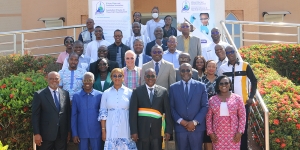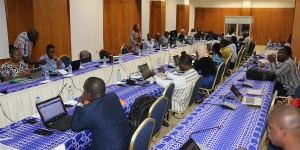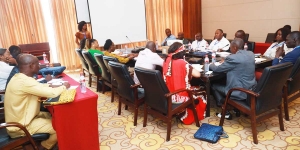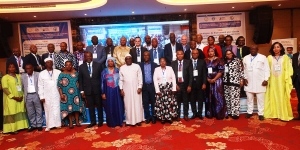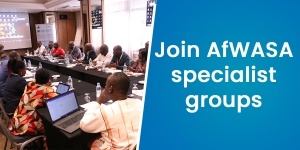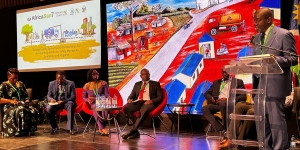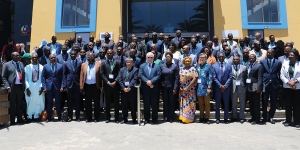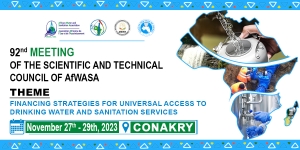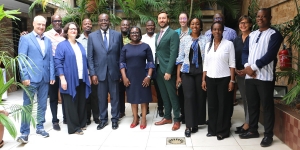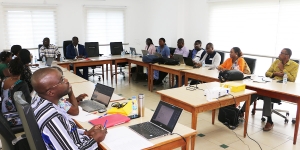Nzickonan Stéphanie
AfWASA annual review workshop: official opening ceremony attended by the 1st Deputy Mayor of Yamoussoukro (Côte d'Ivoire)
The official opening ceremony of AfWASA annual review and planning workshop took place on Monday, December 4, 2023, in the presence of the 1st Deputy Mayor of Yamoussoukro (Côte d'Ivoire), Mr. Baba Sylla. He warmly congratulated the Association's Executive Management on the organization of this workshop. Recalling the importance of water and sanitation for the well-being of communities, he stressed that the Association's efforts in this sector are vital to the sustainable development of the continent. He hoped that the exchanges and discussions would "lead to concrete actions that will benefit African communities by ensuring equitable and sustainable access to water and sanitation".
The second day of the 2023 review and 2024 planning workshop was marked by a review of AfWASA's collaboration with partners (Office National de l'Eau Potable (ONEP), Office National de l'Assainissement et du Drainage (ONAD), Société de Distribution d'Eau de Côte d'Ivoire (SODECI), MUNIWASH, Association Panafricaine des Acteurs de l'Assainissement Autonome (APAA), Réseau des Femmes Professionnelles (RIFPEA) and Réseau des Jeunes professionnels de l'Eau et de l'Assainissement (RJPEA), UNICEF). The results are positive and augur well for the future.
The Association's priorities on Water, Sanitation and Gender programs were also presented, as well as the scholarship program for students at the end of their training.
AfWASA review and planning workshop: staff invited to work together to develop effective strategies
The Executive Management of the African Water and Sanitation Association has been organizing its 2023 annual review and 2024 planning workshop since Sunday.
In his opening remarks, Sylvain Usher, Executive Director of the Association, expressed his gratitude to his collaborators for their contribution to the Association's success. ''Your commitment and dedication have been the pillars of our progress. Together, we have overcome challenges and made significant progress in building the capacity of stakeholders to promote people's access to safe drinking water and quality sanitation services on the African continent," said Mr. Sylvain Usher.
He recalled the importance of water as a vital resource whose sustainable management is essential for the health, food security and economic development of our nations. However, he continued, "320 million Africans still do not have access to drinking water, and 695 million people living in sub-Saharan Africa do not have access to adequate sanitation services. This is why, as the only pan-African organization in the water and sanitation sector in Africa, with a mandate to build the capacity of stakeholders to improve service performance, we have decided to play a leading role in creating a future where every person has access to clean water and adequate sanitation facilities".
He encouraged his colleagues to take an active part in the workshop, to share their ideas and experiences, and to work together to develop effective strategies. We must also strengthen our partnerships with governments, the private sector, civil society organizations and research institutions to maximize our impact," he concluded.
It should be noted that the first day of this workshop was marked by the presentation of the results of activities implemented during the year 2023.
92nd AfWASA STC meeting: the specialist groups develop their action plan
Started on Monday November 27 in Conakry, the 92nd AfWASA STC meeting continued on Tuesday November 28, 2023.
The 1st part of this 2nd day was devoted to the presentation of the Association's activity report, from July to November 2023. This was followed by a progress report on preparations of the 22nd AfWASA International Congress and Exhibition,to be held from February 18-22, 2024 in Guinea Conakry. Finally, the day continued with the start of work by the specialist groups. They were instructed to develop or finalise the Terms of Reference for their group; present a report on activities carry out since the last STC meeting held in Johannesburg ; propose activities to be carried out during the Congress; propose the creation of new specialist groups; and develop an action plan from november to february.
The specialist groups set up are as follows:
1. Development and management of skills in water and sanitation utilities
2. Water quality management
3. Non Revenue Water
4. City-wide inclusive sanitation
5. Investment financing and management
6. Young water and sanitation professionals
7. Data management and digitalization
The 92nd AfWASA Scientific and Technical Council meeting started this Monday in Conakry
The 92nd AfWASA Scientific and Technical Council meeting started this Monday, October 27, in Conakry, Republic of Guinea.
Some 120 delegates from fifteen African and European countries are taking part in the meeting, the theme of which is "Financing strategies for universal access to drinking water and sanitation services".
Our story will be available shortly.
Join us: all about AfWASA specialist groups
Specialist groups are made up of all STC members who are not part of the Strategic Council. They are structured according to sector specialties.
AfWASA gives African professionals and experts in the water and sanitation sector the opportunity to come together voluntarily, in Specialist Groups, and form a think-tank around a particular issue identified by the group itself.
To set up a Specialist Group, a written request must be sent to AfWASA Executive Office. The request must indicate : The name of the new Specialist Group.
-
A clear description of the subject to be covered.
-
A description of the expected results and the activities planned to achieve these results.
-
An action plan and timetable for the next year or 2, together with deliverables.
The request will be forwarded to the Strategic Council, which will assess the appropriateness of creating the Specialist Group. Following approval by the Strategic Council and confirmation by the Executive Board, the new Specialist Group will be published and interested AfWASA members will be invited to join.
A single person can initiate the formation of the Specialist Group, but subject to the nomination of 4 other people to complete the group prior to Strategic Council endorsement.
Members of Specialist Groups must be AfWASA members, either individually or through their member company, and must be officially approved by AfWASA to participate in the Specialist Group. An AfWASA member may belong to a maximum of 2 Specialist Groups at any one time. There is no limit to the number of members in a Specialist Group.
General objectives of the Specialist Groups
The Specialist Groups have the following objectives:
-
Provide a platform for multidisciplinary knowledge development.
-
Bridging the gap between research and practice
-
Ensure effective professional development of researchers in their respective fields to address emerging challenges and propose solutions.
-
Enable researchers and practitioners to improve the solutions proposed to address the major challenges facing the water and sanitation sector.
-
Serve as a catalyst for capacity-building among young professionals
-
Strengthen networks with international specialists
-
Generate revenue through conferences, publications and other events
-
Create and disseminate content and ensure consumption by targeted groups
Work
In order to consolidate knowledge of the water and sanitation professions, the Specialist Groups thus formed will:
-
Organize periodic conferences, mini-congresses and exhibitions.
-
Publish articles for technical journals and best practice manuals.
-
Propose ideas for projects or programs, as well as capacity-building activities (Master Classes or other) on specific themes related to their issues.
-
Publish newsletters to keep you informed of the progress of their work.
-
Produce brochures on topics of interest.
-
Organize information and study trips to one of the Group’s members to share case studies.
-
Organize Conferences, Side-Events, and other types of sessions during AfWASA Congresses to share the results of their work.
-
Take part in major international meetings and exhibitions to which AfWASA is invited, and may also organize conferences and technical sessions.
-
Contribute articles and publications to the AfWASA knowledge-sharing platform and website.
-
Pilot or participate in long-term projects undertaken by AfWASA and funded by development institutions.
Functioning of the Specialist Groups
The Specialist Groups will be bilingual, and may, if necessary, include French-speaking and English-speaking sub-groups to facilitate discussions. French-speaking and English-speaking sub-groups of the same Specialist Group may meet separately to carry out their discussions, and joint meetings of the 2 sub-groups may also be organized on a regular basis, to share the progress of discussions, with simultaneous translation provided by the Executive Management.
At the start of each mandate, a clear and precise definition of the objectives to be achieved is proposed by the Specialist Groups, and action plans are drawn up, to be validated by the Strategic Council and monitored and coordinated by the Executive Management.
The Specialist Committees are required to hold regular meetings, either face-to-face or virtual, 2 to 4 times a year, depending on the activities planned within the group, to exchange information between members and to carry out their activities and deliverables.
When the Specialist Group is set up, two leaders (Group Leaders) are elected by all Group members for a period of 2 years, renewable once. These 2 leaders are responsible for leading the Group towards its objectives. These 2 leaders are supported in their mission by a coordinator at Executive Management level, whose particular mission will be to facilitate the organization of meetings, conferences, study and exploration missions, the production of publications, and the sharing and editing of documents (brochures, best practice guides, etc.).
At AfWASA, we remain convinced that operating in this way will help us to respond more effectively to the needs and concerns of our members and the sector, and to make a significant contribution to achieving the Sustainable Development Goals for Africa.
Are you interested in a specialist group ? Please, send an email to This email address is being protected from spambots. You need JavaScript enabled to view it.
AfricaSan7 day 2: Private operators strive to accelerate and sustain access to sanitation services
A panel discussion on accelerating and sustaining access to sanitation services took place on Tuesday, November 6. The session was co-moderated by Sylvain Usher, Executive Director of AAEA and Yvonne Magawa, Director of ESAWAS.
Among the panelists was the Pan-African Sanitation Association, represented by Sandrine Nanga from Cameroon. She was invited to speak on the key aspects that motivate private sanitation players to improve and expand their service provision.
Responding to the moderator's question, Sandrine Nanga identified three key levers for improving service quality. Regulation, capacity building and finance.
On the regulatory front, she stressed the importance of providing the sector with regulatory instruments that will enable better structuring and organization of private operators. These instruments include approvals and licenses. Citing the example of Yaoundé in Cameroon, she asserts that "every company must obtain an approval and a license before starting any emptying activity. This enables the municipality to make sure that it is formal, but also that it has quality work tools, and that sanitation workers, who are generally marginalized, are socially protected and benefit from employment contracts".
She asserts that as far as capacity building is concerned, she maintains that it is "the fundamental element for improving the service delivery of private operators, as it gives them the technical, managerial and marketing tools to boost their businesses and make them leaders. Capacity building also gives private sector operators the ability to better identify the risks of inappropriate business practice, to protect the environment, to protect themselves and to protect communities.
Turning to the financial aspect, Sandrine Nanga points out that "private companies in the sanitation sector are generally vulnerable. They need to be supported through the establishment of Public-Private Partnerships, as in Niamey in Niger, or Yaoundé in Cameroon, where the management of the faecal sludge treatment plants is handled by the faecal emptiers, thereby strengthening and diversifying their income", she emphasized. She went on to plead for support for business development, through tax measures to reduce customs duties on truck imports."
In addition to these aspects, Sandrine Nanga spoke of the responsibility of sanitation players to the community.
Firstly, participation in data collection. She pointed out that, in Cameroon, each truck is equipped with a geolocation tool that enables monitoring of the quantity of sludge collected. Secondly, participation in a healthy living environment: this means ensuring that all the sludge collected is deposited at faecal sludge treatment plants, where they exist; hence the importance of every town having a faecal sludge treatment plant. Finally, to bring the sanitation service closer to the population, through the creation and use of mobile applications to facilitate service requests.
AfricaSan7 conference starts on Monday in Namibia
The 7th African Sanitation Conference opened this Monday, November 6, 2023 in Swakopmund, Namibia. Held under the aegis of the African Ministers' Conference on Water and Sanitation (AMCOW), the theme of the conference is: “Strengthening Systems and Partnerships for Accelerated Action on Safely Managed Sanitation and Hygiene”.
We'll be back with more information.
Registration is now open!
The African Water and Sanitation Association (AfWASA) is delighted to inform its members as well as the entire water and sanitation sector community that the 92nd meeting of its Scientific and Technical Council (STC) will be held from November 27 to 29, 2023 in Guinea Conakry under the theme: ‘‘Financing strategies for universal access to drinking water and sanitation services’’.The African Water and Sanitation Association is delighted to inform its members as well as the entire water and sanitation sector community that the 92nd meeting of its Scientific and Technical Council (STC) will be held from November 27 to 29, 2023 in Guinea Conakry under the theme: ‘‘Financing strategies for universal access to drinking water and sanitation services’’.
AfWASA would like to remind everyone that this meeting is being held as a prelude to the 22nd International Congress and Exhibition, to take place in Conakry from February 18 to 22, 2024.
AfWASA hereby invites all its members as well as stakeholders and those interested in the development of the water and sanitation sector on the continent, to save the date to participate in this meeting of exchanges around the challenges of access to water and sanitation in Africa.
Registration is now open. Please click on the link to register: https://meetings.afwasa.org/
German-African partnership: annual planning workshop for GAPWAS and AGTIWAS programs is held in Abidjan
The annual planning workshop for the GAPWAS and AGTIWAS projects is being held in Abidjan from October 30 to November 3, 2023. These two projects are funded by the German Federal Ministry of Economic Cooperation and Development (BMZ) in cooperation with Sequa.The implementing partner is GWP and the local partner is AfWASA. While each project has a specific outline, for both projects the objective is to support AfWASA to achieve its vision in becoming a key player in the water sector in Africa.
"International standard: AfWASA to pursue ISO 9001:2015 certification"
In order to enhance its reputation by demonstrating its commitment to quality, responsibility, and member satisfaction, AAEA has embarked on a quality initiative with the aim of obtaining ISO 9001:2015 certification. In this regard, a diagnostic audit of the association's management system commenced on October 25th. The objective is to verify that the implemented management system aligns with the requirements of ISO 9001:2015 standards and to address any discrepancies before the certification audit. This is done with the purpose of ensuring the best chance of success during the certification audit.
According to the Executive Director, Mr. Sylvain Usher, "Certification holds paramount importance, especially given the association's exponential growth. Having the best possible procedures aligned with international standards not only instills confidence in foreign partners and members but also elevates the association's profile on the global stage. It is worth noting that ISO 9001 certification outlines criteria applicable to a quality management system. It is the only ISO 9000 family standard that can be used for certification. This standard is founded on various quality management principles, including a strong customer focus, leadership commitment, a process-oriented approach, and continuous improvement."

 English
English  Français
Français 
